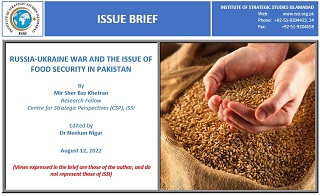Russia–Ukraine war has disrupted agricultural production and trade from one of the world’s major food-exporting regions. Both countries are known as the breadbasket of the world and are fifth largest exporters of wheat. The war threatens to drive rising food prices even higher and create scarcity, especially for regions most dependent on wheat and other exports from Russia and Ukraine. [1] The Economist reports that the war is creating one of the worst disruptions to the supply of wheat since the first world war. As prices spike, the damage from this shock will ripple right across the world affecting corn, vegetable oil, fertilisers, and many other agricultural products. [2]Similarly, the World Bank also reports that the war has not only resulted in a severe humanitarian crisis and a looming increase in global food insecurity, but also in the potential break-up of global cooperation in trade. This could result in a massive 37% jump in food prices.[3]
The State of Global Food Security Issues: Has the Conflict Deepened the Challenges?
Prior to the conflict, with fuel prices being at a seven-year high, 36 countries were already facing a 15% food inflation, creating a high risk for debt distress for 60% of the low-income countries.[4] These countries rely on an extremely concentrated food market supply and reserves, with seven countries making up for 86% of wheat exports. The contribution of Russia and Ukraine in the global food market for wheat and barley export was 30%, which derailed with the advent of the crisis , as Russia suspended all grain exports until August 2022 along with blocking the Black seaports.[5] Moreover, with the damage caused to Ukrainian infrastructure, land and agricultural machinery, experts say that it can cause a wheat shortage for the next three seasons causing an upward pressure on the demand for alternative resources and an increase in commodity and fertiliser prices.[6]















